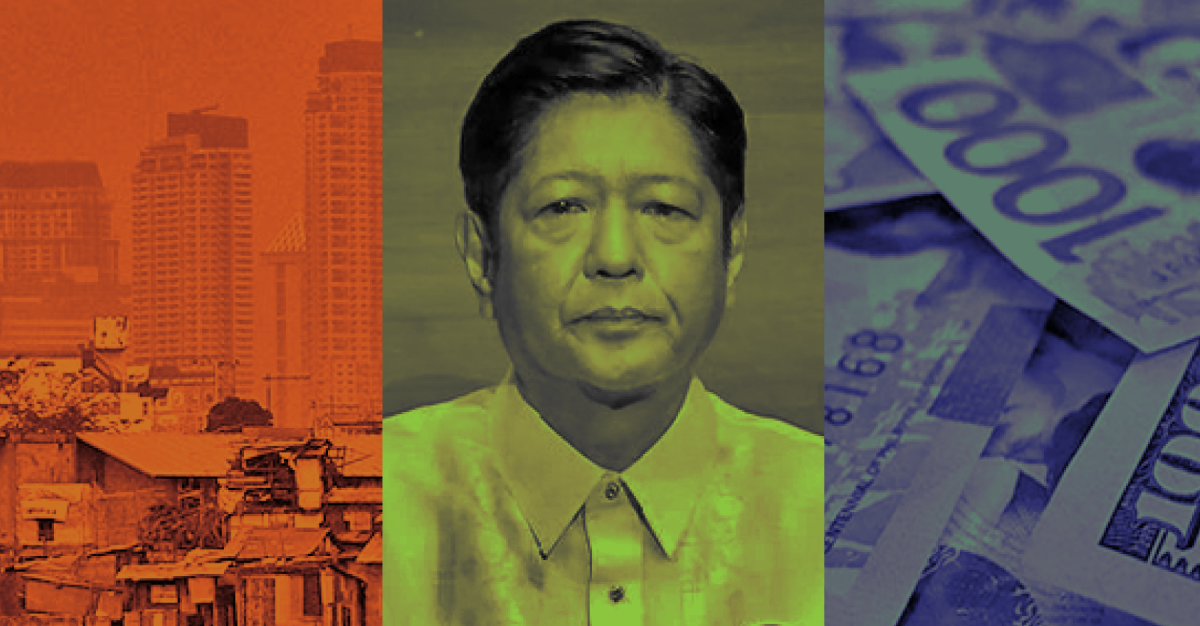Presented by workers, farmers, urban poor sectors and food security advocates during the Peoples Summit Public and Media Forum
June 28, 2023
After the 2022 elections, sectors initiated the People’s Summit and drafted a People’s Agenda which challenged the new government to address the urgent demands of the country’s basic sectors. Six thematic clusters monitored the performance of the Marcos presidency. Here is the summary of the economic cluster’s assessment of the first year of the Bongbong Marcos Jr administration.

DEMAND No. 1. Address rising prices now, by suspending taxes on oil products, imposing restrictions on harmful deregulation policies, supporting a national minimum wage and ending contractualization, and providing adequate aid for the economically displaced during the pandemic.
REALITIES. Despite slightly tempered inflation, the prices of basic necessities – especially that of food, services and utilities have been higher than before the Marcos Jr administration assumed office, and hard for ordinary Filipinos to afford. The government did not take substantial immediate and medium-term measures to essentially lower prices nor for the people to cope with inflation. It did not heed calls to suspend taxes on oil products and did not lift a finger to restrict or reverse harmful deregulation policies that allow untransparent and undemocratic pricing.

The President himself kept mum on the issue of wage increase and did not declare any wage hike proposal as priority legislation despite clamor from the ranks of workers, the larger public, and even some legislators. Instead of ending contractualization it has also condoned the retrenchment of workers in various industries, union busting and other labor rights violations. It has not shown real support for hundreds of thousands of small public utility vehicle workers threatened to be phased-out by exclusionary modernization.
It also only hyped giving ayuda but in fact slashed the 2023 budget of emergency cash assistance and only distributed a small amount to a limited number of poor families, small producers and businesses.
- Year-on-year, inflation in May 2023 at 6.1% is higher than in May 2022 at 5.4 percent. The prices of rice, meat, most fishes and vegetables, garlic, onions and sugar are all on higher range comparing these two periods. Water, electricity rates and transport fares have also gone up.
- No relevant legislation was passed nor prioritized to arrest rising prices.
- No wage increase has been issued by the regional wage boards in the past year despite supervening events. Government agencies like the NEDA have issued pronouncements against any legislated wage increase. Marcos did not declare as priority legislation any of the wage bills — National Minimum Wage based on Family Living Wage, +750 Across-The-Board, 150 Across-The-Board etc. Marcos is mum on the issue of wage increase.
- The real value of the already measly minimum wage has fallen. The P570/day nominal minimum wage in the NCR – the highest nationwide – is equivalent to only around P480/day
- Retrenchments aimed at replacing regular workers with cheaper contractual labor have been carried out by capitalists and condoned by the government, along with other forms of flexible labor. (E.g. termination of workers in Wyeth, Nexperia and garments factories in Cebu.) Issues of violation of labor rights and standards have been revealed within the ranks of platform workers of Shopee, Grab, FoodPanda etc.
- Amid a lack of jobs and livelihood, the government pushed through with the massacre of franchises and livelihoods of jeepney drivers and small operators through the PUV modernization and franchise consolidation programs.
- Despite many suffering (poor quality work, low wages or incomes, no savings), the Marcos government has been scrimping on cash assistance
DEMAND 2. Revive local agriculture and make domestic food production a priority by suspending conversion of agricultural lands, providing P15,000 subsidy for Filipino farmers and fisherfolk, allotting 10% of the national budget for agriculture and ending reliance on importation of agricultural products starting with the repeal of the Rice Tariffication Law.
REALITIES. Marcos Jr is far from achieving his populist campaign promise to lower rice prices to ₱20 per kilo. In fact, the government is continuing the Rice Liberalization Law and has approved further rice importation. The government has continued relying on the importation of other common agricultural items Instead of strengthening the country’s local production sectors to provide the people’s and country’s needs. Pro-farmer and pro-people measures advocating food security and food self-sufficiency remain pending in Congress. The increased agriculture budget has not translated to the well-being of farmers nor the improvement of the agriculture sector. There has been no substantial ayuda for Filipino producers especially the poorest farmers and fisherfolk.

- The country imported a total of 3.8 million MT of rice in 2022, a record-high importation. Our rice import dependency increased to 38.07% from 18.5% from 2.7 million metric tons (MMT) in 2021 to 3.8 MMT last year. Overall, from 2019 to 2023, the rice liberalization law resulted in ₱260 billion in losses for rice farmers.
- Pro-farmer and pro-people measures advocating food security and food self-sufficiency remain pending in Congress. Instead, Marcos Jr. is reviving the Martial Law-era Masagana 99 program to supposedly achieve 97% rice self-sufficiency in the country by 2028. However, under a liberalized rice and agriculture industries dominated by foreign monopoly agro-corporations, the Masagana Rice Program would just be another Marcosian blueprint to promote market-driven and profit-oriented agriculture for the interest of private sectors and foreign investors.
DEMAND NO. 3. Make land reform and national industrialization as the foundation of pro-people economic development, support Filipino-owned industries, ensure local job creation, allot at least 1% of the national budget for scientific and technological research and development, re-nationalize power assets previously owned by the government including the national grid, and address the mass transport crisis by providing more government-owned and managed mass transportation.
REALITIES. The Marcos Jr administration failed to present a transformational comprehensive economic plan and instead continues to tout liberalization – in cahoots with international financial institutions and foreign chambers of commerce – as a development solution. The country’s agriculture and manufacturing sectors, the supposed core of the Philippine economy, are at their lowest levels of share in gross domestic product (GDP) in 70 years. Marcos Jr has persistently neglected farmers’ pleas for a genuine agrarian reform program and free land distribution and is set to promote the financialization of land resources. Instead of strengthening the production sectors to create sustainable jobs, the Marcos government hyped improved employment numbers without caring to address burgeoning informality.
Consistent with having no plans for pro-people economic transformation to ensure the people’s needs, sustainable utilities and services, and the country’s development needs, the Marcos Jr administration’s budget continued to be misprioritized for big-business infrastructure, debt servicing and defense, and failed to allocate for genuine economic and social development.

- Instead of having the promised transformational comprehensive economic plan, the Marcos Jr administration’s economic managers have repeatedly hailed economic liberalization as their magic bullet for development, clinging to obsolete neoliberal policies and even further relying on external sources such as foreign direct investments and overseas workers’ remittances for growth
- In particular, “the amended Public Services and Foreign Investment Acts, Retail Trade Liberalization, and tax-cutting CREATE Law all make the Philippines more profitable for foreign capital. Yet these laws and the Philippine Development Plan 2023-2028, which remain stuck in an obsolete neoliberal globalization framework, prevent the real agricultural progress and national industrialization that is so essential for the country.”
- Marcos Jr persistently neglected farmers’ pleas for a genuine agrarian reform program and free land distribution and is set to promote the financialization of land resources. It has prioritized the legislation of the National Land Use Plan. In September 2022 he released Executive Order No. 4, implementing a one-year moratorium on amortization payments for CARP beneficiaries. He has also expressed support for the proposed New Agrarian Emancipation Act which will condone or write off beneficiaries’ debts. Currently, the bill has passed both Congress and is now only awaiting Marcos Jr’s signature.
- While foreign direct investments (about half of total) largely went to manufacturing (from US$1.6 billion in 1990 to US$12.5 billion in 2017, for instance), the sector fell in terms of share to GDP and total employment (10.1% to 7.9% of total employment in 2022).
- Instead of strengthening the production sectors to create sustainable jobs, the Marcos government hyped improved employment numbers without caring to address burgeoning informality. As of April 2023, there were officially 2.3 million unemployed, 6.2 million underemployed, and based on IBON estimates about 35 million or 73% of the country’s total labor force are in informal work.
- Weakening of local agriculture (10.7% of GDP in 2021) and manufacturing (21.7% of GDP in 2021) , and bankruptcy of small businesses. As of March 2023, the service sector accounts for 59% of the country’s total labor force, much larger than the agricultural sector (25%) and industry (17%). In the industrial sector itself, 53% of the workers are in the construction line, more than those in manufacturing.
- Clearing operations for ambulant vendors, pedicabs, tricycles are ongoing. Aid for small entrepreneurs, especially those in the community, remains non-existent or insufficient.
- Despite the ballooning foreign debt that is about to reach ₱14 trillion, borrowing has not been directed to a significant job creation program and the building of self-reliant industries. The budget has even been increased timidly, resulting in the defunding of important areas in health, housing and education.
- The country’s water, power, telco and transport services are increasingly privatized and becoming more foreign-reliant with new measures (Department of Water, transport ‘modernization’) seeking foreign technologies rather than developing domestic potential to provide the people with affordable, accessible, safe, reliant, efficient and environmentally-sound services and utilities (hence water and power rate hikes, transport fare hikes, etc) ##


